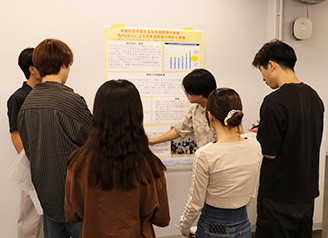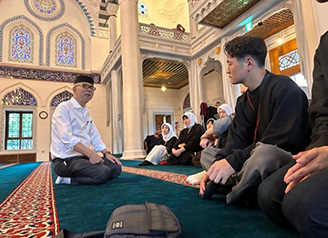In the "Project Seminar" compulsory course for third-year students Faculty of Global Studies, students are researching "what is a multicultural society?", drawing on the knowledge, language skills, and intercultural understanding they have acquired through study abroad etc. In the research survey conducted from April to June, students interviewed foreigners living in Japan about the challenges and problems they face in their daily lives and communities, drawing on previous research and fieldwork both in Japan and abroad.
The survey was conducted among instructors and students of the Matsudo City certified NPO "Study Group for Foreign Children," Muslims who came to pray at Tokyo Camii Diyanat Turkish Cultural Center, and people living in Shanghai who have experience living in Japan. The students compiled the results of their survey in groups and presented them in posters on July 16th.
The number of foreign residents in Japan is expected to exceed 3.4 million by the end of 2023, a new record high. The fieldwork shed light on problems and issues facing foreign residents that had not been identified in previous research or surveys, providing an opportunity to think deeply about the nature of a multicultural society.


The area where I live has a large number of foreign workers, so I wanted to know the current situation of study groups for foreign children. From my interviews, I learned that they are run by volunteers, and that securing instructors, aging populations, and fundraising are difficult issues. In addition to teaching Japanese, they also provide a wide range of support, including for daily life. There are many things that cannot be understood unless you go and ask the local people, so I would like to think about what we can do in the future.
Masataka Kusunoki, a third-year student Faculty of Global Studies (graduated from Yotsukaido High School)
We asked about the challenges facing Muslims in education, such as dietary restrictions and the wearing of the hijab. As students get older, they become more understanding and considerate of religion, but especially in elementary school, there seem to be cases of inconsiderate behavior due to preconceived notions. We felt that multicultural education is necessary for both adults and children, so that educators and adults around them can respond appropriately. We realized that the most important thing is to actually talk to the people involved and deepen our understanding, as we did this time.
Satono Onodera, a third-year student Faculty of Global Studies (graduated from Taga High School)
I was studying abroad at Shanghai Lixin Accounting and Finance University until early July, so I spoke with people in Shanghai who had experience living in Japan. They told me that opening a bank account in Japan was particularly difficult and complicated, and they struggled with it. Perhaps because we were international students, we didn't encounter any particular difficulties or problems opening an account in China, but when comparing the two countries, we realized that the requirements were stricter in Japan, so we looked into the current situation again and thought up solutions. We realized that if we hadn't lived there, we wouldn't have been able to notice the differences in lifestyle and culture, and we wouldn't have been able to experience the generosity and kindness of the Chinese people.
Otoha Funayama, a third-year student Faculty of Global Studies (graduated from Sendai Commercial High School)